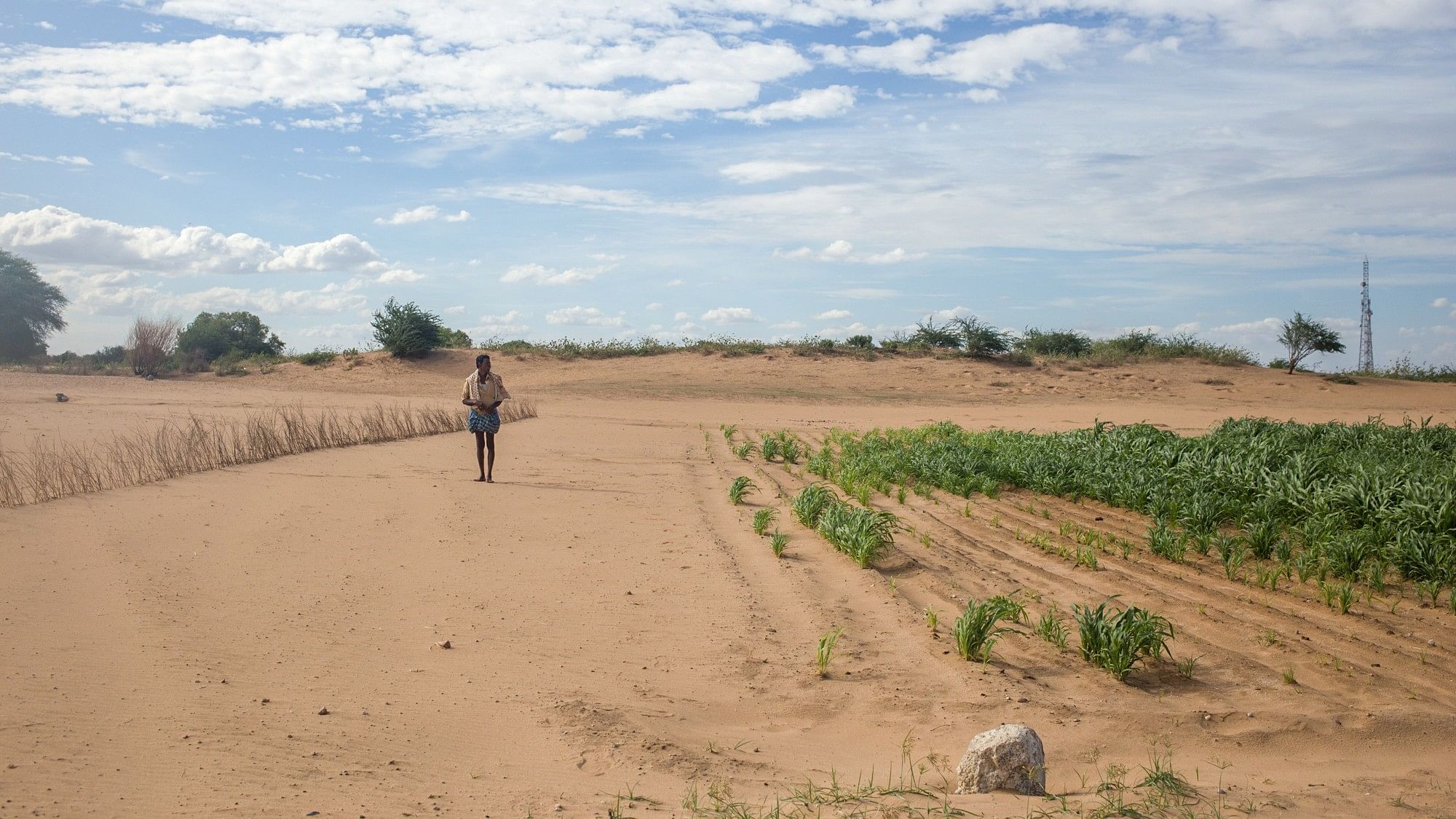
Despite attempts by successive governments to complete irrigation projects worth Rs 12,000 crore, water availability remains a concern in the Rayalseema region.
Photo: UNDP/PARI
Kurnool/Kadapa: Renowned for factional feuds and caste hegemony, the Rayalaseema region, comprising Kurnool, Kadapa, Anantapur, and Chittoor districts, holds significant importance for all political parties in Andhra Pradesh. This region sends approximately 52 MLAs to the state assembly and eight MPs to the Lok Sabha.
Andhra Pradesh is set to hold elections on May 13 for 175 seats in the state assembly and 25 Lok Sabha seats, marking the fourth phase of polling.
The stakes are high for all Andhra parties in Rayalaseema, as both YSRCP supremo Y S Jagan Mohan Reddy and TDP chief N Chandrababu Naidu hail from this region and are contesting from Pulivendula in Kadapa and Kuppam in Chittoor districts, respectively. The Congress, eager to revive its fortunes in Andhra Pradesh, has also nominated its PCC Chief, YS Sharmila Reddy, for the Kadapa Lok Sabha constituency.
The BJP has fielded former chief minister N Kiran Kumar Reddy, who recently joined the party, for the Rajampet Lok Sabha segment in the same region.
Ground interactions conducted by DH revealed that certain sections in Rayalaseema, a region prone to drought, have been advocating for a new capital city, while there is a unanimous demand for improved irrigation facilities.
Kurnool served as the capital of Andhra Pradesh until October 1956, after which Hyderabad became the new capital following the state's merger with Telangana.
"Successive governments have long ignored and neglected Rayalaseema. The capital city designation was also stripped away from Kurnool," noted Narendra, an essential commodities trader in the old city of Kurnool.
Narendra believes that Chief Minister Jagan Mohan Reddy has attempted to address the 'historical injustice' suffered by Kurnool by designating the city as the state's judicial capital as part of his three capitals plan. "Something is better than nothing. We would have at least retained the city as a judicial capital, but that opportunity was also lost after a legal dispute," said Narendra.
As the summer season progresses, temperatures soar to 45 to 47 degrees Celsius in the region, known as the hottest in Andhra Pradesh. Promises of providing irrigation facilities and attracting investments to create job opportunities for youth have been made by all political parties.
Despite attempts by successive governments to complete irrigation projects worth Rs 12,000 crore, water availability remains a concern, despite the presence of the 300-kilometre-long KC canal and the 406-kilometre-long Telugu Ganga projects in the region. Farmers in Rayalaseema frequently clash with their counterparts in neighbouring Karnataka, Telangana, and Tamil Nadu over water-sharing.
"Have people in Telangana become millionaires since the state's bifurcation? That's what KCR promised during his agitation for separate statehood. Rayalaseema suffered greater losses than coastal Andhra due to the state's bifurcation," remarked Jevananda Reddy, a septuagenarian, with a touch of sarcasm, while sipping tea at a shop in the Bus Stand Centre in Kadapa.
Factionalism, a culture of violence fueled by the rivalry between faction leaders who often resort to violence to settle scores and maintain power, has prevailed in Rayalaseema for decades. Tollywood has depicted numerous films depicting Rayalaseema factionalism.
Crude country-made bombs, private armies, axe attacks, and gruesome murders are ingrained in Rayalaseema's culture. However, the number of factional killings in the region has declined. In 2015, state police identified 69 factional groups and seized 3,600 weapons in the Rayalaseema region, compared to hundreds of such groups during the 1980s and 1990s.
"Factionalism has gradually waned over the years due to various reasons. The current generation is more focused on their careers and stays away from such activities. The provision of water by the former government led by Dr YS Rajasekhar Reddy facilitated multiple crop cultivation in certain areas, thereby reducing the influence of factional politics in a historically arid region," stated SV Mohan Reddy, a prominent figure in Kurnool associated with the YSRCP and a close relative of the Bhuma family, known for its involvement in factional violence in Allagadda.
Former Inspector General of Police in Rayalaseema, RP Meena, who was tasked by YSR in 2005 to eradicate factional violence, submitted a report in 2007 stating that the violence instigated by factions was worse than that of the caste-based gangs in Bihar. He submitted a 210-page report to the government.
According to the police, factionalism is largely dormant in Rayalaseema but resurfaces during elections. For instance, the violent clashes that occurred in the Seema region, resulting in three deaths on polling day in 2019, serve as an indicator in this regard.